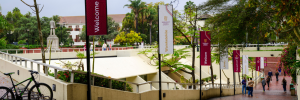
The Library and Information Service on the Stellenbosch campus.
Universities building Africa's next generation of employers — one entrepreneur at a time
- African Universities Day is celebrated on 12 November.
- Universities must help students become tomorrow's employers.
- Universities must be centres of innovation.
African Universities Day is celebrated on 12 November every year. In an opinion piece for University World News, Anita Nel, Chief Director: Innovation and Commercialisation, writes that it is universities’ responsibility — and their greatest opportunity — to help students become the employers of the next generation.
- Read the original article below or click here for the piece as published. In another opinion piece marking the mentioned observance day, published by the Mail & Guardian on 13 November, Prof Deresh Ramjugernath, Rector and Vice-Chancellor, highlights the role of universities as engines of societal change. Read the full article here.
Anita Nel
When I started my career, the job I do today didn't even exist. That reality alone should remind us how fast the world is changing — and how important it is that our universities prepare students not just for existing roles, but for those yet to be imagined.
At Stellenbosch University (SU) and universities across Africa, we have the brightest young minds walking through our doors. We have on average three to four years to teach them wonderful skills. We turn them into near-perfect employees that companies aspire to have. But my message to them is always: Why do you want to be an employee if you can become an employer?
I tell students at SU that what they’re being taught here is how to solve problems from first principles. I urge them to look around and take note: as the people they study with today will be the ones to lead companies, design policy, and drive change across Africa in the years to come. I also encourage them to stay connected to these people — to learn together, dream together, and build together because our continent's youth is its most powerful resource. With half of Africa under the age of twenty, the real breakthrough will come when universities and industry join forces to turn potential into progress.
It is our responsibility — and our greatest opportunity — to help them become the employers of the next generation. This is something we should reflect on as we celebrate Africa Universities Day on 12 November.
Rethinking the African university
No longer can universities remain in ivory towers, sponsored by churches and princes and doing research for the sake of research. To address Africa's unique problems, universities must reinvent themselves and start thinking like business innovators and entrepreneurs. They should be the places where knowledge is applied, not merely published.
The African university of the future will be a centre of innovation that moves ideas from the classroom to the marketplace. In this place, students will leave with more than just their degrees; they will leave with entrepreneurial mindsets, with confidence and the capacity to build, test, and launch.
Universities, incubators and industry
To bridge the gap between research and real-world impact, we've built the Stellenbosch University LaunchLab, which is a living example of how partnerships can move from research to the real world. Here we are turning theory into thriving startups. Since we established the SU LaunchLab over a decade ago, it has grown into one of South Africa's leading university-based startup ecosystems. More than 4 000 students have been inspired and supported through its programmes, while we've mentored over 400 businesses and coached them on their journeys from concept to company. Together, these ventures have generated an estimated R1 billion in revenue in 2024 and attracted over R857 million in investment funding over the pastseveral years.
Our 44 spinout companies currently employ around 500 people, with a combined turnover exceeding R500 million, and most are still in their startup phase. This is why — when universities and industry work together — we don't suddenly end with two mice and a pumpkin at midnight, but happily ever after with a handsome prince.
Creating job makers
I believe Africa's future depends on creating job-makers, not jobseekers. It is our role as universities to help students see themselves as future employers and changemakers. It is a no-brainer.
Our researchers, entrepreneurs, and students understand local problems best — from healthcare to sustainability — and must lead in creating context-appropriate innovations.
If we want to change the face of Africa, we need to look differently at our students, our universities, and our partnerships. Universities must be bold enough to innovate. Industry must be willing to invest and collaborate. And incubators must act as bridges between the two.
It's all in the mind
We can no longer look towards corporates alone to solve Africa's job crisis. We also don't need to run to the rest of the world to ask how to solve our problems. No one understands Africa’s problems better than Africans do. For me, global respect begins with local confidence.
This was evident during the COVID-19 pandemic when South African scientists identified two major variants early. We had the skills and knowledge, but lacked the production capacity for vaccines. The lesson is simple: we have the talent, but we need to connect our capabilities. Universities and industry can — and must — close that gap.
Through hackathons, boot camps, mentorship programmes, and entrepreneurial challenges, we at SU create and cultivate a culture of initiative in practice. We see this every day: when industry partners with universities co-design these experiences, we create a fertile space where new ventures — and new mindsets — thrive.
Creating the future through networks
At SU, we know that every young person we empower to start a business or create a job multiplies impact across families and communities. We believe that when we create networks, incubators and innovation hubs that connect students, researchers, entrepreneurs, industry leaders, and society we unlock exponential growth.
In an effort to build an ecosystem around our university, we found that its membrane is quite thick, making it's challenging to allow free access to outsiders. So we created, actively and very proactively, what we call the Stellenbosch Network — an active body that has grown to 400 members. The network is bringing together township entrepreneurs, CEOs, academics, local government, and nonprofits to share ideas, mentor, and find solutions together. It's an ecosystem of collaboration.
Making innovation matter
We need to look differently at our students, our universities, and our partnerships. Universities must be bold enough to innovate. Industry must be willing to invest and collaborate. And incubators must act as bridges between the two.
Transformation in Africa will come from the ideas we nurture at home: With every student who chooses to employ rather than be employed. Because with one employee or one entrepreneur at a time, we truly can change the face of Africa.
*Anita Nel is Chief Director: Innovation and Commercialisation at Stellenbosch University, South Africa. This article is based on her speech delivered recently at the 4th annual Future of Work National Dialogue in Pretoria.



